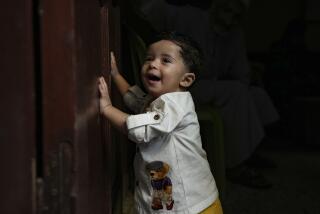A Tiny Symbol of Change for Iraq
- Share via
HOLON, Israel — Just over a week old, Bayan Jabbar is proof that some of the rules have changed since the fall of Saddam Hussein.
The ailing Iraqi girl, born with a life-threatening heart defect, was recovering in an Israeli hospital today after emergency surgery Wednesday and a journey that would have been unthinkable under an Iraqi ruler who treated Israel as the most bitter of enemies.
Volunteers who worked to ferry the infant from her Kurdish village near the northern Iraqi city of Tikrit said the open-heart procedure here appeared a success. However, they cautioned that postoperative bleeding meant that Bayan’s condition was fragile.
The fact that the volunteers were able to secure her quick transfer here from Iraq to get medical treatment was being cast as one sign, at least, that some barriers had crumbled along with the Hussein regime.
“This would not have happened nine months before,” said Simon Fisher, executive director of the Israel-based Save a Child’s Heart, which arranges emergency heart surgeries for children.
“It’s especially good for the patients who need help,” said Bayan’s father, Jasem, as he and his wife, Iman, waited out the surgery amid the glare of television cameras. “Before, we couldn’t even think of coming to Israel.”
The operation to repair Bayan’s reversed arteries -- a potentially fatal condition -- was done under the sponsorship of the Israeli charity, which has made a name for itself over the last decade by shuttling more than 900 children from foreign nations, as well as from the West Bank and Gaza Strip, for heart surgery at Wolfson Medical Center here in Holon, outside Tel Aviv.
Although the group is accustomed to the bureaucratic headaches that accompany transfers of fragile patients, Bayan’s case was especially difficult. The volunteers who encountered the girl in Iraq had to figure out a way to move her through Jordan to Israel, bearing freshly minted travel documents that were unfamiliar to immigration officials in those countries.
“The only hope I had was getting her here,” said Jonathan Miles, an American volunteer who works with a Christian charity and who came across Bayan and her family during a trip to Iraq.
Last week, Miles and other members of his group, called Shevet Achim, met Bayan while visiting a children’s clinic in Tikrit where a U.S. Army physician was providing volunteer treatment. The infant had been brought in two days after her birth on the recommendation of the delivery doctor, who saw that she was not well.
The Army physician, identified by the volunteers as Lt. Col. John Scott, performed a sonogram that indicated the artery problem. The girl was moved to a hospital in Baghdad that, while better equipped, was unable to carry out the complicated surgery required to give her a chance at survival.
Miles contacted Save a Child’s Heart, and a physician at Wolfson advised the Baghdad doctor on an interim surgical procedure Friday to keep Bayan alive until she could be taken to Israel.
The volunteers arranged travel documents, issued by U.S.-appointed Iraqi officials, while the Israeli group hurriedly worked diplomatic channels to ease the family’s entry.
After flying to Amman, Jordan’s capital, the infant and her parents traveled by taxi to the Israeli border and then by cab to Holon, arriving Tuesday.
By Wednesday night, the parents appeared road-weary and disoriented from worry. Jasem Jabbar, 28, who makes a living selling ice during the summer, nibbled peanuts and sipped tea in a waiting room outside the hospital’s intensive care unit. On the other side of the swinging doors lay three babies from Gaza and the West Bank who also were undergoing heart treatments under the auspices of Save a Child’s Heart.
Jabbar said he had been made to feel comfortable in Israel so far and acknowledged that his family’s trip was the result of a changed geopolitical landscape.
“The change was good,” he said in Arabic through an interpreter. But he stopped short of predicting whether his family’s experience carried broader implications for the future of the two nations.
“This is a political problem,” he said. “This is not my problem.”
An hour later, word came that the surgery was over, but with complications that meant the parents’ anguished waiting was not. Jabbar stared ahead, his wife, teary-eyed beneath a scarf, at his side.
“It’s not going to make a difference whether I’m worried or not,” he said. “It’s all in the hands of God.”
More to Read
Sign up for Essential California
The most important California stories and recommendations in your inbox every morning.
You may occasionally receive promotional content from the Los Angeles Times.













